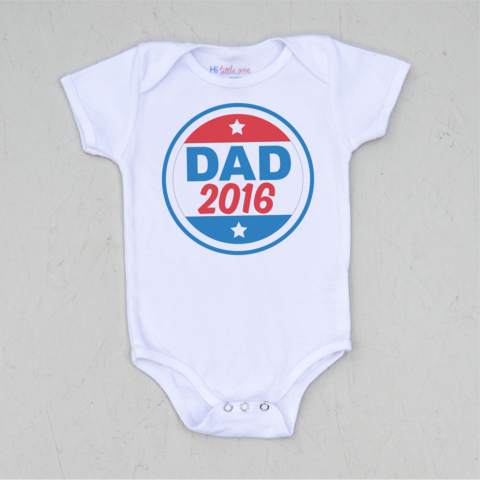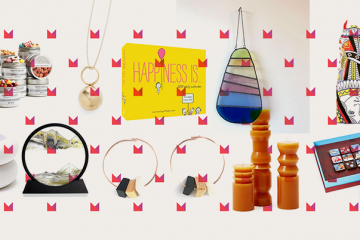Guest Post: Talking Politics with Kids
 In this heated election year talking to your kids about politics is pretty much non-negotiable. Even if your son or daughter is not asking direct questions, young minds are definitely tuned in to the presidential race. Kids are trying to make sense of everything they hear, and let’s face it—campaigns and debates don’t always bring out the best in people. This makes your job as a parent critical. Although many of these tips may seem focused on older kids, you can always shape them into ways to address politics with younger kids by simplifying them. I’ve made ** notes with each one and included an additional tip just for addressing politics with the littlest ones in the nursery to pre-k set where needed. I’m happy to provide practical tips from psychologist Dr. Stephanie O’Leary on talking politics with kids. Let’s raise the next generation of thoughtful leaders!
In this heated election year talking to your kids about politics is pretty much non-negotiable. Even if your son or daughter is not asking direct questions, young minds are definitely tuned in to the presidential race. Kids are trying to make sense of everything they hear, and let’s face it—campaigns and debates don’t always bring out the best in people. This makes your job as a parent critical. Although many of these tips may seem focused on older kids, you can always shape them into ways to address politics with younger kids by simplifying them. I’ve made ** notes with each one and included an additional tip just for addressing politics with the littlest ones in the nursery to pre-k set where needed. I’m happy to provide practical tips from psychologist Dr. Stephanie O’Leary on talking politics with kids. Let’s raise the next generation of thoughtful leaders!
So, how do you help your child sort things out, juggle strong opinions, and navigate some very “adult” topics this fall? Here are five tips from a psychologist on talking politics with kids to make sure your parenting strategy leads to a win:
1. Focus on empowerment
Even though your child may be years away from voting, it’s never too early to talk about being active and involved. Discuss issues that are important to your family, neighborhood, and culture. If possible, take your child with you when you vote at least once. That experience makes a lasting impression and will send the message that participating in the process is something to look forward to.
2. Just say no to hysteria
Adults say all sorts of things out of emotion and most of them are taken with a grain of salt—except if you’re a kid. Kids interpret things more literally and, despite what you might think, they believe most of what their parents say. Be ready to explain that people (maybe yourself included) don’t always mean what they say. So, Aunt Rose is not moving to Canada if this one wins and the country will probably not be destroyed if that one wins.
3. Listen to your what your child has to say about politics
The easy part will be opening your ears. The tough part will be holding your tongue, momentarily, but it’s crucial to give your child a chance to share his or her ideas and questions without immediately launching into a lecture (or possibly a rant). Creating a judgment-free zone for your child will send the message that you really value their point of view. ** Your little one may not be expressing opinions, ideas or questions about politics at a very young age so don’t pressure them or push your ideas on them. There will be plenty of time for healthy debate later! Instead talk to your little one about what a President is and how everyone gets to vote according to their beliefs and that’s one thing that makes our country great. You could even show them the map of the country and where you live, where the President lives, etc. In other words, start with basics and see where they go from there. If they start asking questions…great! If not, let it go.
4. Guide, but don’t push
If your child cites misinformation or parrots headlines without a solid understanding of the issues, take time to review facts and give your child space to draw his or her own conclusions. While the urge to have your child see things from your perspective may be strong, raising a thoughtful consumer of information is the goal. This protects your child from buying into ideas just because someone else tells them to. ** Little ones may hear people talking about candidates or issues and repeat it without knowing what it means at all. Take a moment to bring it to their level, emphasizing thinking about the options and making their own conclusion. i.e. Some people think everyone should get milk at school, other people think you should bring your own milk to school. Which would you vote for and why? You might be surprised to hear their thoughtful explanation even at this young age.
5. Send the message that respect is non-negotiable
Undoubtedly, campaigns involve some degree of mud slinging. This is a hard concept for kids to accept, especially as they are held to high standards when it comes to combating bullying and treating peers with kindness. Explain that even well educated adults sometimes behave poorly and that communicating respectfully is the best way to be heard. And don’t tolerate below-the-belt commentary during family conversations. ** Preschool is oddly similar to the debate stage these days so you have some great classroom examples to use for a teachable moment. Explain that you can’t truly solve problems by being mean. It’s best to listen to all sides and then talk about how to play together. Say that some grown ups forget this sometimes and that we shouldn’t see them as good examples but know that everyone makes mistakes.
====
And, to get kids excited about election time, I love the Election Collection from HiLittleOne that has a lighthearted and well-designed selection of personalizeable onesies, tees and totes for the whole family ranging from $19 to $29. Their pieces come in beautiful packaging and are equally as soft and luxurious to wear. Here are some of Metro Mom Club’s favorites:
About the Author:
Dr. Stephanie O’Leary is a Clinical Psychologist specializing in Neuropsychology, and a mom of two. She provides parents with a no-nonsense approach to navigating the daily grind while preparing their child for the challenges they’ll face in the real world.







